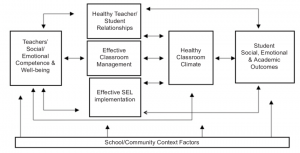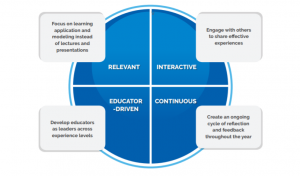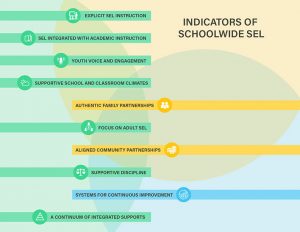TL;DR:
- SEL (Social-Emotional Learning) is as important as academic learning.
- For successful SEL implementation, teacher training frameworks must develop educator social-emotional competence and understanding of students’ Social-Emotional Learning needs.
- Integrate SEL by adding an SEL PLC session to your regular schedule. CASEL offers a school-wide guide to SEL.
- Four classroom SEL practices are explicit instruction, integrated with academics, youth voice and engagements, and a supportive environment.
Did you know that Social-Emotional Learning is just as important as academic learning? It’s true. Your social, emotional competence aka, emotional intelligence, is responsible for up to 80% of success in your personal and professional life.
I know there are still educators who look at SEL as something extra, or only for the kids they feel bad for. But SEL is to education as the alphabet is to reading; you can’t have one without the other.
SEL influences judgment and decision making, service orientation, and your ability to adapt to audiences and situations, take responsibility, fix problems (creatively), manage feelings for positive win/win resolution, and so much more.
So if you haven’t noticed, SEL is gaining momentum. All 50 states have preschool SEL competencies and 18 have K-12 SEL competencies. Take a look at CASEL’s Interactive State Scan to learn more about the standards in your state.
For successful SEL implementation, it's imperative to build a teacher support framework that emphasizes the development of educator social-emotional competence and understanding of students' social-emotional learning needs. Share on XLevel 1 of SEL Implementation: Developing Educator Social-Emotional Competence and Understanding of Student SEL
While our momentum with SEL is impressive, there are still significant gaps in implementing school-wide SEL.
A national scan of Social-Emotional Learning and teacher preparation explores the following key findings:
- Key Finding 1: Colleges of Education in 47 states have developed 1-3 core Teacher SEL dimensions. The only program that addressed four of the five core SEL dimensions is in the District of Columbia.
- Key Finding 2: The promotion of student SEL is given little attention in required courses in teacher preparation programs in colleges of education in the US. 49 states did not address any of the five core Student SEL dimensions.
- Key Finding 6: State-level certification requires coursework that develops teacher SEL but does not address student SEL and learning context.
If we want to impact students, we have to teach teachers. For successful SEL implementation, it’s imperative to build a teacher support framework that emphasizes the development of educator social-emotional competence and understanding of students’ social-emotional learning needs.

With student SEL dimensions, teacher self-awareness, and self-management absent from teacher preparation programs, it’s a must for your school community to advocate for in-service and professional development training that emphasizes school-wide Social-Emotional competence.
You can spend a school year on adult SEL growth alone before implementing your school-wide SEL plan that will emphasize the entire school community.
Level 2 of SEL Implementation: Integrating SEL with Your PLC
I’ve become a big believer in Professional Learning Communities (PLC) over the past few years. There’s barely time to go to the bathroom during the school day, let alone have a conversation with your peers.
But we need time to collaborate, reflect, and apply what we’ve learned to improve our students’ social, emotional, and academic outcomes.
Unfortunately, most PLCs are ‘traditional,’ which includes being talked at for an hour about sometimes relevant information, with no opportunity to connect or provide input.
In the same way, teachers need to empower student voice and engagement, administrators need to empower teacher voice and engagement.
PLC’s create opportunities to develop leaders, build stronger relationships, and enhance social-emotional competence.
A simple way to start is by adding an SEL PLC session to your regular schedule. CASEL’s school-wide guide to SEL has an excellent resource for Using Grade level or Content Area Team Meetings to Support SEL.

This tool provides discussion prompts divided into four categories:
- supportive classroom environment
- integration of SEL into instruction
- explicit SEL instruction
- student-centered discipline
Consider taking 10 minutes out of regular PLC meetings or dedicating one PLC a month devoted to SEL. As education finally begins to adapt and change, we’ve got to be ready to support our school communities in ways that we never have before.
Level 3 of SEL Implementation: SEL Classroom Practices
I’m sure you’d rather jump right into level 3 and get started in the classroom, and you can.
But the impact of SEL deepens with a systematic approach and strong adult social-emotional competence.
The classroom is where all three levels of SEL implementation come together. Here are four classroom SEL foundations that contribute to students’ social, emotional, and academic outcomes:
- Explicit SEL instruction: Students have consistent opportunities to cultivate, practice, and reflect on social and emotional competencies in ways that are developmentally appropriate and culturally responsive.
- SEL integrated into academics: Students have regular opportunities to share perspectives on SEL, allowing them opportunities to participate in building their classroom community.
- Youth voice and engagement: Staff honor and elevate a broad range of student perspectives, providing students opportunities to shape SEL, school climate, and culture initiatives.
- Supportive school and classroom environment: Establishing an SEL team goes a long way to providing the supportive community educators need to deliver effective SEL implementation in classroom communities.
Impacting students’ social, emotional, and academic outcomes
Why focus so much on adult SEL? Because to impact students, we have to support teachers.
Developing educator social-emotional competence means:
- Teachers are spending more time building healthy student-teacher relationships, modeling effective classroom management, and implementing SEL with fidelity. And spending less time redirecting behaviors.
- Administration is spending less time managing tier 1 fires because teachers have the SEC solve 80% of their classroom problems.
- Develop a community of emotionally intelligent educators with decreased levels of stress and improved teacher support practices.
- Naturally, integrate SEL practices with academic learning without overhauling how you plan or prep.
- Students feel equipped with skills like empathy and confidence.
For more information about how to come back better with adult SEL, visit the Teach Better Speakers Network or visit seleducators.com for adult social-emotional learning activities and curriculum.
Our goal is to provide your school community with an educator support program—one that improves adult social-emotional competence to impact students’ social-emotional and academic development.

Resources
Schonert-Reichl, Kimberly A, et al. “To Reach The Students, Teach The Teachers: A National Scan of Teacher Preparation & Social Emotional Learning .” CASEL.org, Feb. 2017, www.casel.org/wp-content/
Jennings, Patricia A., and Mark T. Greenberg. “The Prosocial Classroom: Teacher Social and Emotional Competence in Relation to Student and Classroom Outcomes.” Review of Educational Research, vol. 79, no. 1, 2009, pp. 491–525., doi:10.3102/0034654308325693.
“Indicators of Schoolwide SEL.” Indicators of Schoolwide SEL – Casel Schoolguide, schoolguide.casel.org/what-is-
“Developing Professional Practices to Improve Student Outcomes Through Professional Learning Communities.” Products, 15 Jan. 2021, www.edweek.org/products/
Click here to see the full blog series!
About Tre Gammage
Dean of Students & SEL Consultant, Tre’ Gammage has always had a passion for helping others. With a vast background in speaking, podcasting, and consulting, Tre’ was once told “when you see someone living their dream, it makes you want to be a part of that dream” and he’s been living by that motto ever since.
In 2017, Tre’ started The Gammage Consulting Group, An Adult SEL Focused education consulting firm helping K-12 school communities support teachers’ social-emotional competence to impact students’ social-emotional and academic outcomes.
Tre’ believes in making it easier to do what you love, your job as an educator is to prepare the next generation for success. Having strong Social & Emotional Intelligence is foundational to impacting student outcomes.
To learn more information visit seleducators.com or listen to The Dash Podcast on Youtube, Itunes, Spotify.




